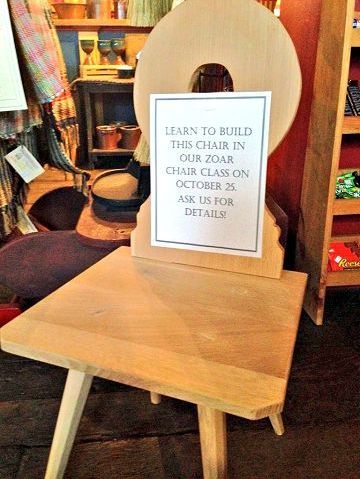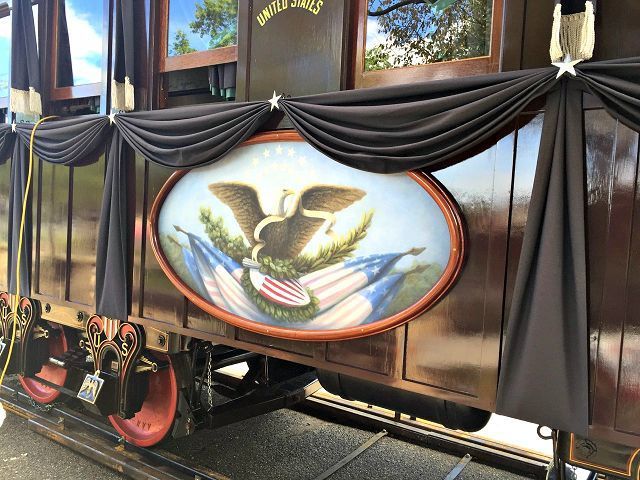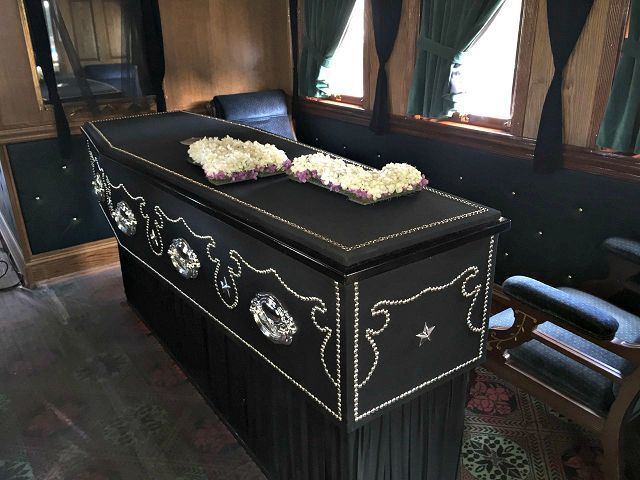Lincoln Funeral Train car brings out history enthusiasts
After months of anticipation, the recreated Lincoln Funeral Train car arrived at Warther Museum in Dover for a three-day appearance Oct. 2-4 from 9 a.m. to 5 p.m. each day.
The car was five years in the making, and is the work of David Kloke of Kloke Locomotive Works in Illinois. It is one of three major projects the firm has undertaken.
We have created two locomotives, one of which is the locomotive used in the Lincoln Funeral Train, said Kloke during a break in setting up the Lincoln Funeral Train car at the Warther Museum. The first locomotive we did took 10 years, the second a lot less time. When asked how one undertakes such a large project as recreating an antique train locomotive from scratch, Kloke smiled.
One piece at a time. Its the only way to do it. You have to break it down into manageable pieces. We spent a lot of time getting the details just right, Kloke said.
Each piece of the Lincoln Funeral Train car had to be replicated completely from scratch.
We have a couple of lanterns from the original car, but we had to pretty much forge every part, Kloke said. He grabbed a section of rather elaborate iron railing at the front of the cars exterior and said, These were all hand forged. Kloke said he worked from photographs of the original car, known dimensions and plenty of outside expert advice and assistance. We had to create blueprints by assembling what we knew, he said.
The original train car was not intended to be Lincolns funerary transport. It had been ordered by the federal government as a private train car for use by the president and staff, much as Air Force One is used today. Lincoln never used it, finding it unseemly to travel in a custom train coach during wartime.
After Lincolns funeral, the car never saw government service again, as no president wanted to use it. Kloke said the car was sold off and passed through ownership by several railroad companies before burning up in a fire in 1911.
Kristen Moreland, assistant director at the Warther Museum, and the great-granddaughter of Ernest Mooney Warther, was excited to have the Lincoln Funeral Train car exhibited at the home of Warthers carvings.
We were very pleased when the chance to do this came our way, she said. It has taken a lot of planning and a few delays, but here it is, at last.
Moreland said interest in the train car has been high, with the museum fielding many calls and inquiries over the summer.
Each day of the exhibition was interspersed with lectures by various speakers on topics surrounding former President Lincoln, the Civil War or the daily lives of people from the 1860s. Speakers addressed the role of women in Tuscarawas County during the war, music of the Civil War era and the story of Warthers famous carving of the Lincoln Funeral Train on display at the museum.
Sunday featured a demonstration by Union and Confederate troop re-enactors.
Although tastefully appointed inside with period furniture, and accessories, Kloke said the funeral car might be less fancy than many people would expect in a presidential train car. This was before the era of the very elaborate Pullman custom railcar, he said. Its very functional, but they didnt go overboard with the Victorian decoration.
The final stop on the tour that took the locomotive through 13 cities and six states is Hammond, Indiana, Oct. 8-11.
The Warther Museum is located at 331 Karl Ave. in Dover. Their website is www.warthers.com.






